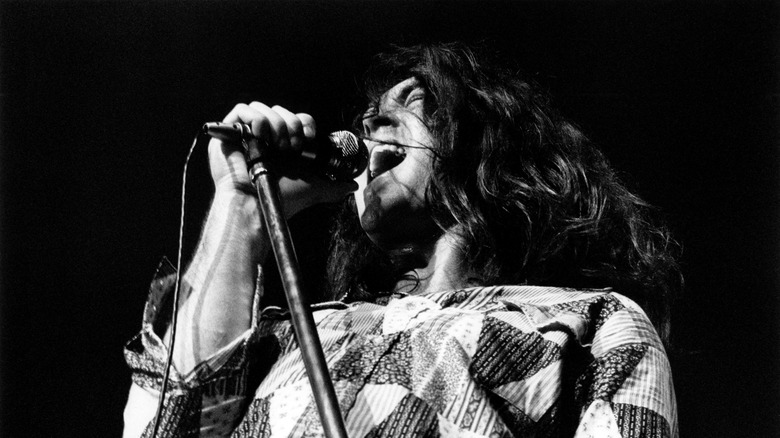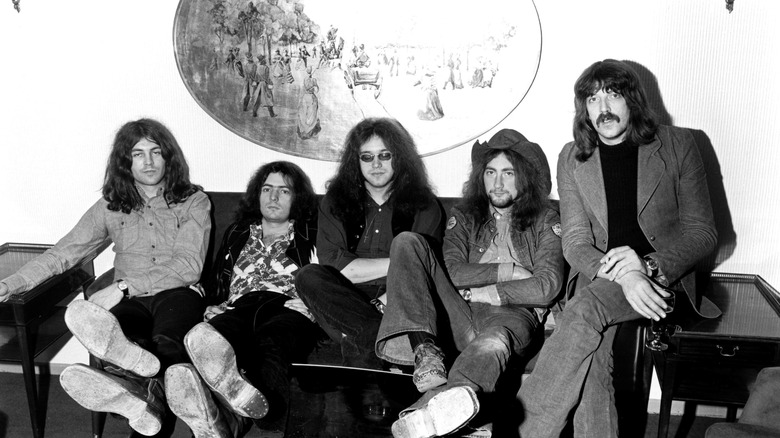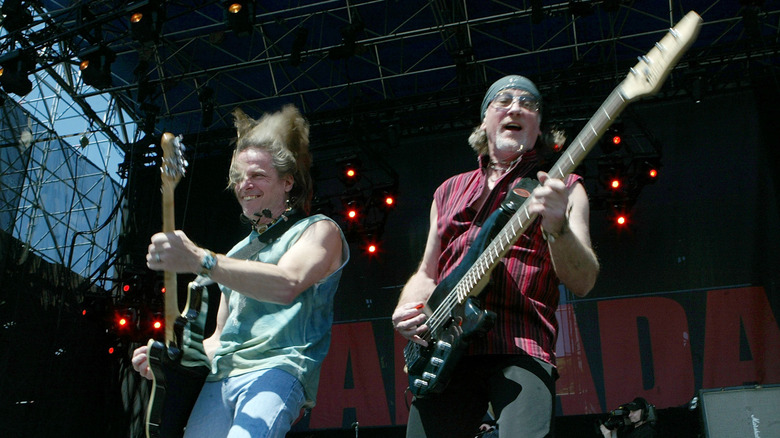How Deep Purple Earned The Record For The Loudest Band In The World
By the 1970s, rock 'n' roll had already changed quite a bit since its formative years in the 1950s. As the genre evolved from early pop-friendly rock to garage to psychedelic, some bands skewed harder, heavier, and louder. Deep Purple was among those pioneers of hard rock, and they even earned the Guinness World Record for "Loudest Pop Group" in the 1975 edition of the book (here's how they got their name).
Deep Purple formed in London in 1968. Their original lineup consisted of Ritchie Blackmore on guitar, Jon Lord on keyboard, Ian Paice on drums, Nick Simper on bass, and Rod Evans as the frontman. By 1969 though, Evans and Simper were out, replaced by singer Ian Gillan and bassist Roger Glover, whom the other members thought would be a better fit to play the heavier sound Deep Purple was going for. It was this lineup (which was not the last) that once set the record for loudest band when they played London's Rainbow Theatre.
The band was so loud, 3 people passed out
By 1972, Deep Purple had already released seven albums in the four years since the band's inception. In 1968, they had a No. 4 hit on the Billboard Hot 100 with "Hush" from their first album, "Shades of Deep Purple." But its 1972 album "Machine Head" spawned some of the band's most well-known songs, like "Smoke on the Water" and "Highway Star," and they were fresh when the band unleashed a 117-decibel show at London's Rainbow Theatre. Though the band played the concert in 1972, the record was in the 1975 edition of the Guinness Book of World Records. According to the entry, the high decibels were achieved with the band's "10,000-watt Marshall P.A. system." The sound was "sufficient" to "render three members of their audience unconscious."
While it's not clear if it was actually the noise that made people pass out or something else, there are plenty of physical effects extremely loud noise can have on the body. Sounds ranging from 100 to 150 decibels can cause eardrum rupture and drainage, dizziness, pain, and hearing loss. This is especially true for sounds sustained for longer periods of time.
Loudest isn't always best
Deep Purple earned the title of loudest pop group by playing about as loud as thunder, which can sometimes be 120 decibels. But they didn't keep the record for long. In 1976, the Who knocked Deep Purple out of the loudest band spot when they played an outdoor stadium in London and got the volume up to 126 decibels. According to Metal Hammer, several other bands beat out Deep Purple and the Who in subsequent decades, but it wasn't always officially recorded as an effort to break the record. Manowar earned Guinness's top spot in 1984, and they beat their own record in 1994 by playing a show at 129.5 decibels — nearly as loud as a jackhammer or an ambulance.
That's when Guinness made the decision to get rid of the loudest band world record (one of the many that are no longer accepted), saying that it didn't want to encourage bands to strive for something that caused hearing damage. Deep Purple, who always had a reputation of being a loud band regardless of the record, changed their tune as well.
"We used to be pretty loud, but I think the focus has changed now," frontman Ian Gill said in a 2015 interview on German TV. "The impact of sheer volume was one thing that used to get written up about. The equipment now is so sophisticated, you can have volume without pain. It's actually enjoyable; you're not running around with your ears ringing after the show like you used to be. There's a lot more focus on what's actually going on on stage. You can get involved with that a lot more. I think it's a vast improvement over what it used to be."


